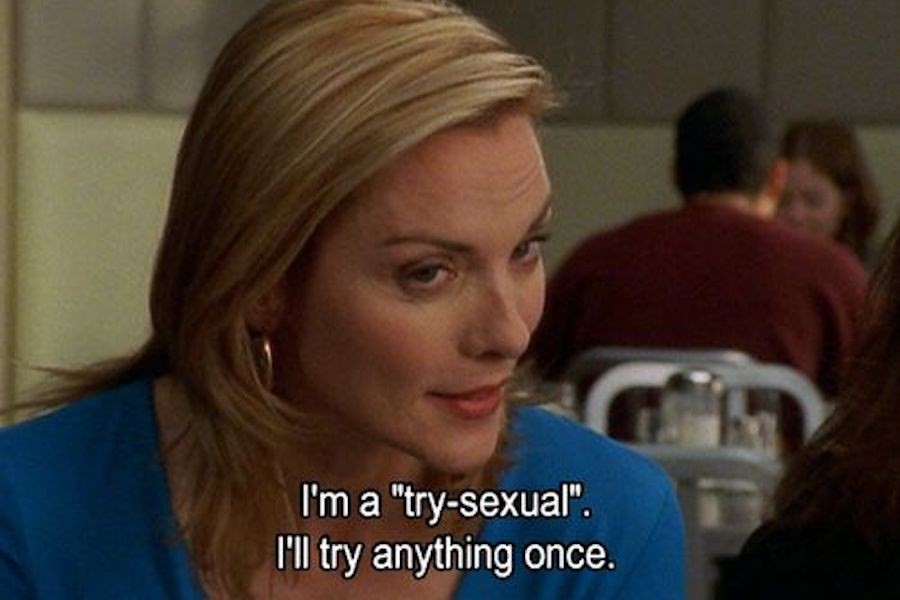
As a modern society, we categorise an affair as one of the worst things you can commit in a relationship. It’s the ultimate betrayal, a violation of trust, a wrecking of the “home” you’ve built, whether emotional or literal.
For many, there’s no coming back from an affair. It’s a dealbreaker, a taboo space that is too fragile to prod at with questions. As someone who has engaged with affairs — predominantly as the other woman — I’ve seen the cowardice of dishonesty and the darkness of guilt. But I’ve also seen the flipside, where affairs can be vessels for which to explore truth and expose desires.
My involvement has made me aware of just how often cheating occurs in monogamous relationships, and how commonly it seems to be due to a communication breakdown.
According to Sexual Health Australia, around 60% of men and 45% of women admit to engaging in an affair, with some estimates putting the number as high as 70% of all marriages having experienced one. I mean, over twelve thousand people reportedly sign up to Ashley Madison — a dating website dedicated to extramarital affairs — every single day, so the stats echo my real-life observations.

Affairs are fucking common. And, while I don’t condone dishonesty; I kinda understand why they exist.
So, when my friend Rachel* messaged me out of the blue the other night to tell me that she was engaging in an affair that was saving her relationship, I had to know more.
Rachel is in her mid-30s and identifies as a super sexual person. She’s been with her partner, Sam*, for 4 years, and she says they’re pretty in love. He ticks a lot of her boxes — except one crucial one.
Early into their relationship, Rachel could tell something wasn’t ‘right’ with their sexual dynamic, because Sam hadn’t made any passes. She wasn’t used to that.
“I mean, we first had sex eight months into our relationship!” she tells me.
“He told me he hadn’t had much sex in his life and that he doesn’t really feel comfortable in it. He struggles to get it up. But by that time I’d fallen in love with him and it didn’t matter to me.
“I was used to masturbating daily and getting myself off, so it didn’t feel like a loss or anything.”
But then, Rachel met Ben*.
The start of the affair
Ben is married, and works in a different department of Rachel’s work, in real estate. At first, it was a few flirty texts. A big part of their job is texting images of houses and client details back and forth, so it wasn’t hard to pepper in a few spicy comments and a winky face here and there.
“As we got a little braver and could sense that we were both into each other, the texts started getting more suggestive,” she explains, “until they became straight up sexting.”
“One day, he asked me to come meet him at a property. We knew what was going to happen in broad daylight, completely sober and in a house that just was about to go on the market.
“We were both super nervous. I could feel the jittery energy from the moment I walked into the house. It was thrilling. Once we started kissing and touching each other, the nerves dissipated and it all made sense.
“I look back now — a few months in — and laugh at how awkward that first time was.”

Now, Rachel and Ben steal away any time together that they can get. She does property visits with him, where things get frisky in different rooms of houses that are getting ready to be sold. They set up makeshift beds in the back of one of their cars and have a “quick sesh” in between meetings. She sends him videos of her naked and touching herself, waiting hungrily for his response mid-work-day.
She says that she feels some guilt about it, naturally, but it’s overridden by how guilty Sam feels because he can’t provide for her sexually. Plus, Rachel says she’s an expert at disconnecting sex from her emotions. She sees it as a physical release, and something she can experience as something purely physical, rather than leaving her emotionally impacted.
“I’ve never ‘made love’ — if that’s a thing that actually happens,” she says.
“Of course, there are emotions that happen within sex that feel good, but in terms of having a deep emotional connection during sex; it’s nada for me.
“I think it’s due to my years of being single and having copious amounts of one-night stands, maybe I’m a little dissociated from my emotional vulnerabilities during sex.”
Why do people engage in affairs rather than end the relationship?
“Monogamy may still be deemed as the most ‘socially acceptable’ relationship structure, it doesn’t mean it suits everyone or that we need to adhere to it,” Adelaide-based sexologist and sex columnist Jamie Bucirde tells PEDESTRIAN.TV.
“But there are many other types of relationship dynamics out there that may fit you and your partner/partners better. Non-monogamous, polyamorous and open relationships are becoming more popular and are represented in mainstream media more than ever before.”
What works for you will look different to somebody else, Bucirde says. And, when you aren’t interacting with a relationship structure that feels aligned to your needs, it’s natural to look outside the boundaries.
Everyone experiences sex differently too, Bucirde says.
“It may be emotionally charged for someone, and more physically charged for others. How you experience sex may also change and adapt over time as sexuality is not linear, but fluid.”
Despite being aware that there are experiences within sex that she hasn’t had — such as being emotionally connected and present with the other person — Rachel doesn’t feel the need to change her relationship dynamic as it stands.
“I think emotional vulnerability in sex scares me,” she says. “I’m typically quite an emotionally charged person, but pairing that emotional intensity with sex is scary.”

Right now, Rachel feels the best she’s ever felt. She’s in a loving relationship with Sam, who is dependable, loyal, caring and only has eyes for her, and she’s getting the sexual satisfaction that she craves from Ben, without the fear of emotional intimacy.
Plus, the affair is wildly helping her relationship with Sam.
“I’ve completely stopped feeling resentment towards Sam, because I’m getting my box ticked elsewhere, literally.
“I’d started getting to the point where I was hating him for not wanting to not even touch me sexually. No amount of lingerie or less-than-subtle hints made him bat an eye and I guess I just felt unwanted. It was like he just didn’t notice.”
But now, Rachel is falling in love with her body again. She’s going to the gym, meditating, eating better, buying sexy lingerie, and even investing in a new glass dildo. She likes what she sees when she looks in the mirror and feels connected to her sexuality in a new and vibrant way, which is making her much happier in her relationship.
According to Bucirde, this isn’t unusual.
“Having good, regular sex can increase self-confidence and tap into your own sexual wellbeing and pleasure,” she says.
“There’s nothing more empowering than feeling good about yourself sexually. Feeling present in your body can boost confidence and help you feel more liberated as a sexual being.”
Physically, it can help reduce stress and anxiety and increase happiness, she adds. Research supports that regular sexual activity is linked to increased positive mental wellbeing.
This newfound empowerment within herself, her sexuality and her body, is impacting how Rachel sees her relationship with Sam. She’s not getting annoyed at him, or feeling cooped up anymore.
Sam has commented on her change, on how happy and calm she’s been. “I guess women can have pent-up anger from sexual frustration too,” she laughs.

According to Rachel, it’s helping Ben’s relationship with his wife, too.
“His partner is much like mine, so we’re in a similar position and he feels it takes the pressure off of her, too. We’ve discussed this many times, and make sure to keep checking in.
“We’re both happy with our partners and our lives, we just want to have wild animalistic sex and walk away like it was nothing. And we’ve found that release in each other.”
I can’t help but question the word “happy”, here. To me, happiness in a relationship is getting your needs met… which is something Rachel is having to look for outside of her relationship.
That being said, non-monogamy is becoming much more popular among daters today. Perhaps, this is her version.
Last year alone, over 1.8 million Gen Z joined the dating site Ashley Madison (according to the site), and more than half (59%) said they seek multiple partners because the constraints of a traditional relationship, and that the expectation that one person alone could meet all their needs, was not realistic.
Research from Tinder found that one in three Aussies set their Relationship Type on the app as “open to exploring” in 2023, and you only have to go online to see blind dating / connectivity events popping up in every progressive neighbourhood (yes, Collingwood, I’m looking at you).
So, while Rachel wistfully tells me that she believes “all good things must come to an end”, maybe there’s a world in which they don’t. And maybe we’re living in it.
Today’s world is a world where Rachel can talk to Sam about her need for primal sex, and Sam has the ability to allow her freedom to explore that physical desire outside of their romantic and emotional relationship.
“Ben and I are, in a sense, doing what we need to do to save our relationships,” Rachel says.
“It might be wrong for some, but not for everyone.”
The ideals within “right” and “wrong” are changing. We’re living in a world that is opening up enough for us to create our own blueprint for the relationship we desire, and that can be one that evolves with us.
And while Rachel and Ben are experiencing liberation and self-discovery through their affair — that they feel is in fact helping their respective relationships — it’s important to acknowledge the devastating nature of affairs, too.

For those who discover their partner’s affairs, the experience can be life-altering. Regardless of intention or perceived benefits, dishonesty within any close relationship can be devastating. The impact of discovering your partner’s infidelity, whether emotional, physical or both, can have traumatic consequences. It’s been associated with disordered eating, depression, anxiety, PTSD, heath attacks, and even “broken heart syndrome”, aka stress-induced cardiomyopathy. While some couples who have experienced infidelity stay together (and some say it improves their relationship for the better), almost half of couples split up.
Lying to your partner and yourself about what you desire just isn’t sustainable.
“Understanding your needs and how to communicate them safely is the best way to get what you want,” Bucirde says.
As for Rachel, she knows this situation isn’t forever — but it’s the one that’s working for both her and Ben for now.
“I think we’ll make a mutual decision to end it at some point,” Rachel says, “but I’ll always remember this part of my life as an amazing and awakening experience, and move on.”
*Names have been changed.



